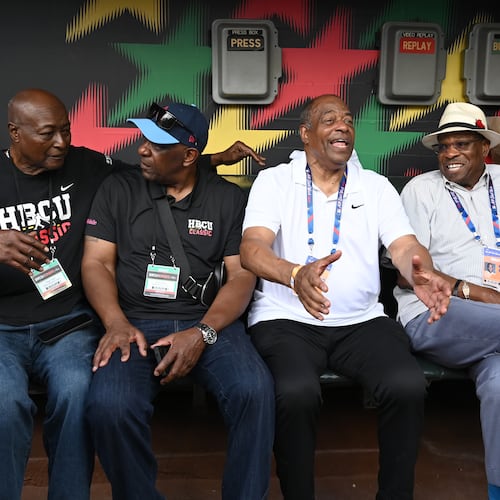Over the past five seasons, the Braves have won 13 more games than San Francisco and two fewer than St. Louis. The Braves have made the playoffs three times, same as the Giants; the Cardinals have made it four years running, though they have the Braves’ Epic Collapse of 2011 to thank for the first of those. Not much has separated the three teams — from April through September.
October is another animal. Since 2010, the Braves are 0-3 in playoff series — counting the wild card play-in as a series — and 2-7 in postseason games. The Giants are 8-0 and 26-10; the Cardinals are 8-2 and 30-22. The Giants won the World Series in 2010 and 2012; the Cardinals won in 2011 and lost to Boston last year. One of the two will play for the title again.
Why do the Giants/Cardinals flourish in October while the Braves go splat? (The Braves didn’t make it this time, doing their splatting in September.) It’d be easy to say, “They’ve just been great teams,” but they really haven’t. The Braves won 96 games in 2013; the best San Fran has done this decade is 94 wins in 2012; St. Louis has topped 90 wins only once.
In their eight postseason series victories, the Giants have entered with the lesser record three times. Of their eight, the Cardinals had the lesser record five times. They have, not get metaphysical, risen to the moment. But how exactly does that rising occur? And why haven’t the Braves — or the Dodgers, or the Nationals — done it?
After Washington, which won 97 games, was eliminated by the Giants, who won 88, Nats shortstop Ian Desmond told the Washington Post: “If I had the answer, I would probably have made the adjustment.”
We bemoan the Braves’ lack of clutch hitting, not just in the playoffs, and that’s valid. Since 2011, the Braves have ranked 18th, 29th, 18th and 28th in the majors at hitting with runners in scoring position. They did, however, outhit San Francisco with RISP in its championship year of 2010. And the Cardinals fared much worse with RISP (hitting .258) this year than last, when they hit an unbelievable .330.
We lament the Braves’ reliance on the home run and their propensity to whiff, and both San Francisco and St. Louis are better — it would be hard to be worse — at putting the ball in play. The Cardinals finished last among National League teams in homers but had the fewest strikeouts, which might be seen as an endorsement of Small Ball. (So might the ascent of the Royals, who ranked last in the majors in home runs and first in fewest K’s.) That said, the Cardinals beat L.A. with the Long Ball; of their 18 runs in the Division Series, 13 came on homers.
As for the Giants: Their three runs, two of which were unearned, in Tuesday’s clincher came on a walk, a groundout and a wild pitch. Was that clutch hitting or bad pitching/fielding? Those who worship at the altar of on-base percentage cringe when they see San Francisco coming: The Giants were 17th in the majors in OBP in 2010; they were 18th this season.
We’ve griped that the Braves don’t have a No. 1 starter, but the best No. 1 starter in baseball (Clayton Kershaw) lost twice to the Cardinals. Detroit started three Cy Young winners against Kansas City and got swept. The Giants had a No. 1 in Tim Lincecum when they won in 2010, but he was in the bullpen in 2012 and is again. Adam Wainwright — once a Braves’ prospect, we ruefully recall — is a No. 1, but he missed the 2011 season. Chris Carpenter, then the Cardinals’ best pitcher, has retired.
We can’t say that the Cardinals and Giants keep winning in October with the same gritty-gutty guys. Only three Redbird regulars — Yadier Molina, Matt Holliday and Jon Jay — remain from their 2011 champs; only two everyday Giants — Buster Posey and Pablo Sandoval — are holdovers from 2010, and the Panda was benched that postseason. The Cardinals have a different manager than in 2011; the Giants, who had Brian Wilson as closer in 2010 and Sergio Romo in 2012, have Santiago Casilla now.
We’ve seen yet again that October defies prediction. The top four betting choices — the Nats, the Dodgers, the Tigers and the Angels — have been eliminated. Seeking to ascribe order to chaos, we speak of such ephemera as “leadership” and “the will to win.” Giants manager Bruce Bochy invoked the latter, but that’s too pat: Didn’t the Nationals want to win, too? And if “leaders” were so essential, why did such exemplary men as Brian McCann, Martin Prado and Tim Hudson never “lead” the Braves to a postseason series victory?
In postseasons to come, it probably would behoove the Braves if they didn’t strike out so much, but who really knows anything about October? As Russell Carleton of Baseball Prospectus wrote in an email: “The problem with the playoffs is that once you get there, you’re playing other really good teams. It means that everyone has a roughly 50/50 shot. And once you lose one of those coin flips, you can’t have another chance until the next year.”
The Braves will try again next year with a new general manager, the same manager and surely a different center fielder. Maybe that will lift them into October. And if every postseason is indeed a coin flip, the Braves are way past due to call one right.
About the Author
Keep Reading
The Latest
Featured


